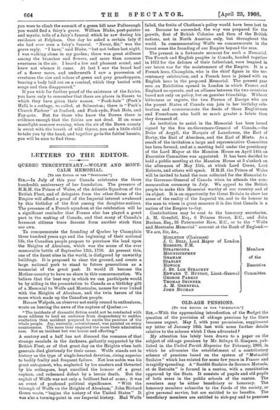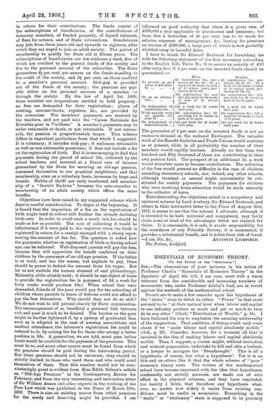OLD-AGE PENSIONS.
[TO TI111 EDITOR OF TUN sesankron.1 SIR,—With the approaching introduction of the Budget the question of the provision of old-age pensions by the State becomes urgent. May I, with your permission, supplement my letter of January 18th last with some further details relative to the scheme which I then advocated P My attention has lately been drawn to a paper on the subject of old-age pensions by Mr. Selwyn G. Simpson, pub- lished in the United Parish. Magazine for February, 1908, in which he advocates the establishment of a contributory scheme of pensions based on the system of " Mutualite Scolaire" which has existed for some few years in France and is rapidly spreading. A "Societe Scolaire de Secours Mutuels, et de Retraite" is formed in a canton, with a constitution approved by the State. It consists of pupils and old pupils of both sexes in the public schools of the canton. The members may be either beneficiary or honorary. The honorary members subscribe to the funds of the society, or give personal service, but are entitled to no benefits. The beneficiary members are entitled to sick-pay and to pensions in return for their contributions. The funds consist of the subscriptions of beneficiaries, of the contributions of honorary members, of funded property, of lapsed interests, of fines for arrears, and of State subventions. Beneficiaries may join from three years old and upwards to eighteen, after which they are urged to join an adult society. The period of membership to qualify for State aid is fifteen years. The subscriptions of beneficiaries are ten centimes a week, five of which are credited to the general funds of the society and five to the personal account of the subscriber. The State guarantees 44 per cent. per annum on the funds standing to the credit of the society, and 3i per cent, on those credited to a member's personal account. Sick-pay is provided out of the funds of the society ; the pensions are pay- able either on the personal account of a member, or through the society. By the law of April 1st, 1898, these societies are corporations entitled to hold property : no fees are demanded for their registration : places of meeting, account-books, registers, &c., are provided by the commune. The members' payments are received by the teachers, and are paid into the " Caisse Nationale des Retraites pour in Vieillease." A member's payments may be either returnable at death, or not returnable. If not return- able, the pension is proportionately larger. This scheme differs in important particulars from that which I suggested. It is voluntary; it includes sick-pay; it embraces returnable as well as non-returnable premiums ; it does not include a fee on the registration of birth. But it is encouraging to find that payments during the period of school life, collected by the school teachers, and invested at a liberal rate of interest guaranteed by the State for securing an old-age pension, commend themselves to our practical neighbours, and that membership, even on a voluntary basis, increases by leaps and bounds. Habits of thrift are early inculcated, and member- ship of a "Societe Scolaire " becomes the ante-chamber to membership of an adult society which offers the same benefits.
Objections have been raised to my suggested scheme which deserve careful consideration. To begin at the beginning. It is feared that the imposition of a fee on the registration of birth might tend to reduce still further the already declining birth-rate. In order to avoid such a result this fee should be made as low as possible. The cost of collecting it would be infinitesimal if it were paid to the registrar when the birth is registered in return for a receipt stamped with a stamp repre- senting the amount of the fee. The question is asked how the payments, whether on registration of birth or during school age, can be enforced. Well-disposed parents will pay the fees, because they will appreciate the benefit conferred on their children by the assurance of an old-age pension. If the father is at work, and has the means, but neglects to pay, there should be power to deduct the amount from his wages. But let us not exclude the human element of real philanthropy. Maternity clubs already exist; it should be one object of these to provide the registration fee (a payment of 3d. a week for forty weeks would produce 10s.) When school fees were demanded, friends of the poor would pay for the schooling of children whose parents in times of distress could not afford to pay the fees themselves. Why should they not do so still? We do not wish to kill private charity by State organisation. The encouragement of so beneficial a personal link between rich and poor is much to be desired. The burden on the poor might be further lightened if, by a system of graduated fees such as is adopted in the case of nursing associations and medical attendance, the labourer's registration fee could be reduced to 5s. by raising the fee for those who occupy a better position in life. A generation, we are told, must pass before funds would be available for the payment of the pensions. This must be so, and some other source must be found from which the pensions should be paid during the intervening period. But these pensions should not be universal; they should be strictly limited to those who need them and who could avail themselves of them. That this number would not be over- whelmingly great is evident from Miss Edith Sellers's article on "Old-Age Pensions" in the Contemporary Review for February, and from the very interesting and instructive letter of Sir William Anson and other experts in the working of the Poor Law which was published in the Times of March 19th, 1908. There is also an existing source from which pensions for the needy and deserving might be provided. I am
informed on good authority that there is a gross sum of £650,000 a year applicable to almshouses and pensions ; but from this a deduction of 40 per cent. has to be made for salaries, expenses of management, &c., leaving for pensions an income of 2390,000, a large part of which is now probably whittled away in harmful doles.
I have to thank Sir Edward Brabrook for furnishing me with the following statement of the fees necessary (according to the English Life Table No. 3) to secure an annuity of 213 after sixty-five, if 4 per cent. on the invested funds should be guaranteed :—
Hales.
,E1 registration fee, pro- To provide an an-i dueing £4 19s. 6d.; 21. a nuity of en after< week for 40 weeks in each
65 ... ... ... of 10 school years, pro- ducing ,23 Os. 63.
I 10s. registration fee and Or, as an alterna- 2id. per week for 42 weeks tive... ... ... in each of 10 school years.
Or, independent off 213. a week for 52 weeks registration fee ... I. each year.
If the annuity, were floe, registration fee ; Id. not payable till-, per week for 43 weeks in
after 70 ... ... I, each of 10 years.
Or, independent off lid, per week for 45 weeks registration fee ...1.. each year.
The guarantee of 4 per cent, on the invested funds is not an excessive demand on the national Exchequer. The valuable work of the Benefit Societies and Trade-Unions would continue as at present, while in all probability the number of their members would rapidly increase. Already no less than two hundred and fifty thousand of these are contributing to their own pension fund. The prospect of an additional 5s. a week would stimulate more to become contributors. The collection of the fees would present no difficulty in the case of children attending elementary schools, nor, indeed, any other schools, although terminal or annual might conveniently be sub- stituted for weekly payments. The payments for children who were receiving home education would be made annually to the collector of taxes.
Notwithstanding the objections raised to a compulsory and universal scheme by Lord Avebury, Sir Edward Brabrook, and others in their instructive letter to the Times of August 31st, 1907, it seems to me that the scheme I advocate, although it is intended to be both universal and compulsory, may fairly claim some at least of the advantages which are claimed for theirs. It is reasonable, it is safe, it avoids responsibility for the soundness of any Friendly Society, it is economical, it provides a substantial benefit, and it is free from risk of fraud.
Females.
El registration fee, pro. clueing E4 6s. 53.: 23. a week for 48 weeks in each of 10 school years, pro- ducing 28 13s. 36.
10s. registration fee ; 213. per week for 49 weeks in each of the 10 years.
3d. a week for 44 weeks each year.
10s. registration fee ; lid, a week for 36 weeks in each of 10 years.
lid, per week for 52 weeks each year.























































 Previous page
Previous page